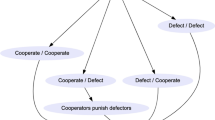Abstract
Modern societies are characterized by competing organizations that rely predominantly on incentive schemes to align the behavior of their members with the organizations’ objectives. This study contributes to explaining why in so many cases incentive schemes have gradually crowded out cooperation as an organization device. Our explanation does not draw on free-riding, the obvious Achilles’ heel of cooperation, but relies completely on fundamental group contest mechanisms. By investigating a canonical rent seeking model and adopting an evolutionary perspective, the analysis identifies shortcomings in previous results, sets the record straight, and explains why the process of incentivizing organizations is protracted.
Similar content being viewed by others
References
Aidt, T., & Hillman, A. (2008). Enduring rents. European Journal of Political Economy, 24, 545–553.
Angelopoulos, K., Philippopoulos, A., & Vassilatos, V. (2009). The social cost of rent seeking in Europe. European Journal of Political Economy, 25, 280–299.
Ansink, E., & Weikard, H. P. (2009). Contested water rights. European Journal of Political Economy, 25, 247–260.
Arce, D. G. (2010). Corporate virtue: Treatment of whistle blowers and the punishment of violators. European Journal of Political Economy, 26, 363–371.
Baik, K. H. (2008). Contests with group-specific public goods prices. Social Choice and Welfare, 30, 103–117.
Baik, K. H., & Lee, S. (2007). Collective rent-seeking when sharing rules are private information. European Journal of Political Economy, 23, 768–776.
Baik, K. H., & Lee, D. Do rent-seeking groups announce their sharing rules? Economic Inquiry (http://onlinelibrary.wiley.com/doi/10.1111/j.1465-7295.2009.00280.x/pdf) (Forthcoming)
Baik, K. H., & Shogren, J. F. (1995). Competitive-share group formation in rent seeking contests. Public Choice, 83, 113–126.
Cheikbossian, G. (2008). Heterogeneous groups and rent-seeking for public goods. European Journal of Political Economy, 24, 133–150.
Chen, K., & Tang, F. (2009). Cultural differences between Tibetans and ethnic Han Chinese in ultimatum bargaining experiments. European Journal of Political Economy, 25, 78–84.
Congleton, R. D., Hillman, A. L., & Konrad, K. (Eds.) (2008). 40 years of research on rent seeking, vols. 1&2. Heidelberg: Springer.
Davis, D., & Reilly, R. (1999). Rent-seeking with non-identical sharing rules: An equilibrium rescued. Public Choice, 100, 31–38.
Epstein, G. S., & Mealem, Y. (2009). Group specific public goods, orchestration of interest groups with free riding. Public Choice, 139, 357–369.
Gächter, S., Kessler, E., & Königstein, M. (2009). Performance incentives and the dynamics of voluntary cooperation, http://www.vwa.unisg.ch/org/vwa/web.nsf/1176ad62df2ddb13c12568f000482b94/2ddd2b2a959a4296c125744a0034d626/$FILE/GaechterKesslerKoenigstein_12-02-09.pdf.
Hausken, K. (2000). Cooperation and between-group competition. Journal of Economic Behavior & Organization, 42, 417–425.
Heller, W. B., & Sieberg, K. K. (2010). Honour among thieves: Cooperation as a strategic response to functional unpleasantness. European Journal of Political Economy, 26, 351–362.
Hillman, A. L., & Samet, L. (1987). Dissipation of contestable rents by small numbers of contenders. Public Choice, 54, 63–82. Reprinted in Congleton et al. (2008).
Hillman, A. L., & Riley, J. G. (1989). Politically contestable rents and transfers. Economics and Politics, 1, 17–39. Reprinted in Congleton et al. (2008).
Hillman, A. L. (2009). Hobbes and the prophet Samuel on leviathan government. Public Choice, 141, 1–4.
Kahana, N., & Liu, Q. (2010). Endemic corruption. European Journal of Political Economy, 26, 82–88.
Katz, E., & Tokatlidu, J. (1996). Group competition for rents. European Journal of Political Economy, 12, 599–607. Reprinted in Congleton et al. (2008).
Konrad, K. A. (2004). Bidding in hierarchies. European Economic Review, 48, 1301–1308. Reprinted in Congleton et al. (2008).
Konrad, K. A. (2009). Strategy and dynamics in contests. Oxford: Oxford University Press.
Lazear, E., & Rosen, S. (1981). Rank-order tournaments as optimum labor contracts. Journal of Political Economy, 89, 841–864.
Lee, S. (1995). Endogenous sharing rules in collective-group rent seeking. Public Choice, 85, 31–44.
Nitzan, S. (1991). Rent-seeking with non-identical sharing rules. Public Choice, 71, 43–50.
Nitzan, S., & Ueda, K. (2010). Prize sharing in collective contests. http://www.biu.ac.il/soc/ec/wp/2010-08.pdf
Olson, M. (1965). The logic of collective action. Cambridge: Harvard University Press.
Reuben, E., & Tyran, J. R. (2010). Everyone is a winner: Promoting cooperation through all-can-win intergroup competition. European Journal of Political Economy, 26, 25–35.
Riechmann, T., & Weimann, J. (2008). Competition as a coordination device: Experimental evidence from a minimum effort coordination game. European Journal of Political Economy, 24, 437–454.
Ryvkin, D. (2010). Contests with private costs: Beyond two players. European Journal of Political Economy, 26, 558–567.
Tullock, G. (1980). Efficient rent-seeking. In J. Buchanan, R. Tollison, & G. Tullock (Eds.), Toward a theory of rent–seeking society (pp. 97–112). College Station: Taxas A&M University Press. Reprinted in Congleton et al. (2008).
Ueda, K. (2002). Oligopolization in collective rent-seeking. Social Choice and Welfare, 19, 613–626.
Ursprung, H. W. (1990). Public goods, rent dissipation, and competition. Economics and Politics, 2, 115–132. Reprinted in Congleton et al. (2008).
Author information
Authors and Affiliations
Corresponding author
Rights and permissions
About this article
Cite this article
Ursprung, H.W. The evolution of sharing rules in rent seeking contests: Incentives crowd out cooperation. Public Choice 153, 149–161 (2012). https://doi.org/10.1007/s11127-011-9778-y
Received:
Accepted:
Published:
Issue Date:
DOI: https://doi.org/10.1007/s11127-011-9778-y




